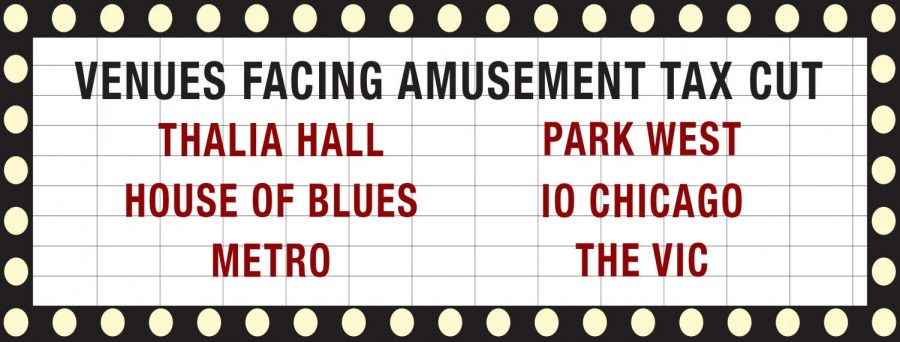Venues show mixed reaction to amusement tax changes
October 23, 2017
Chicago concertgoers and theater patrons may be paying less for their tickets under a proposed tax reform in the city’s 2018 budget—unless they are seeing “Hamilton,” that is.
Mayor Rahm Emanuel’s proposed budget, which was unveiled Oct. 18, would alter the 5 percent amusement tax on ticket sales levied against 750-plus capacity venues, expanding the tax immunity to venues under 1,500 capacity.
However, venues that fall above the new threshold will see a drastic tax increase, with the amusement tax jumping from 5 to 9 percent, according Emanuel’s 2018 budget proposal.
A reform like this was a long time coming and will give midsize venues a fighting chance, said Bruce Finkelman, managing partner of 16” on Center, a company that operates several venues around Chicago, including The Empty Bottle, 1035 N. Western Ave., and Thalia Hall, 1807 S. Allport St.
“[The reform] gives the industry a little bit more of an opportunity to be able to exist and thrive,” Finkelman said. “Chicago has always portrayed itself as a cultural hotbed, but unfortunately, it’s pretty expensive to run a venue.”
Existing venues will be given more breathing room to expand and compete with larger venues, he added.
“It’s a great thing,” said Charna Halpern, owner of iO Chicago, which would no longer be subject to the amusement tax with the proposed reform. “It shows that [Emanuel] cares about the arts, and he cares about Chicago theater because this is an important theater town.”
Not only is this a clear-cut win for midsize venues, but it may prove to be positive for consumers, Halpern said. Theaters and music venues receiving the break could feasibly offer cheaper tickets, she added.
About 30 theaters, restaurants and bars will be newly exempt should the amusement tax reform pass, while about 15 would be subject to the new 9 percent tax, according to the budget proposal.
Venues such as Concord Music Hall, 2047 N. Milwaukee Ave., and “Hamilton” home CIBC Theatre, 18 W. Monroe St., are close to the capacity cutoff: The Concord has a 1,600 person capacity, and CIBC seats 1,800 people.
However, even a tiered system or a lighter tax increase would have left some people upset, Finkelman said.
“No matter where they cut it off or if they tiered it or did whatever metrics they follow to make the legislation, someone’s going to be unhappy, and someone’s going to be happy,” Finkelman said. “There’s no way to really make everyone benefit from what they’re planning to put in place.”
A little more than $1 million of the anticipated tax proceeds would go to the Department of Cultural Affairs and Special Events to support various public arts projects, including the 2018 Year of Creative Youth, Riverwalk installations and public arts programming, according to an Oct. 13 city press release.
The Year of Creative Youth is set to be unveiled Oct. 30, so DCASE Chief Marketing Officer Jamey Lundblad declined to share further details on the program. He did, however, say he was excited that his department would be receiving the funding.
“We’re thrilled that a portion of the additional amusement tax revenue collected by the city as a result of this change will support expanded youth programming and cultural investments,” Lundblad wrote in an Oct. 19 emailed statement.
Finkelman was also excited the arts are expected to get supplemental resources as a result of the reform.
“For someone who has a 12-year-old daughter, for us to [do] whatever we can to improve, increase and be able to partake in any cultural event is really important to the city,” Finkelman said.








